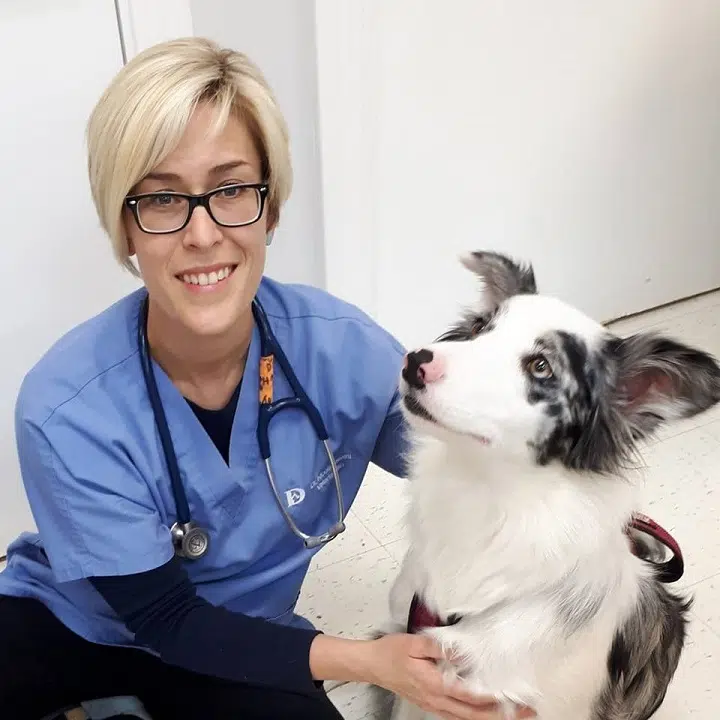
Dr. Nicol Jewett (Photo: courtesy of Douglas Animal Hospital)
In 2020, the Canadian Veterinary Medical Association, joined with a Kinetic, research company to look at the status of Veterinarians in the country.
Results found that the country is currently facing a vet shortage.
Registrar for the New Brunswick Medical Association Dr. Nicole Jewett is also a practicing small animal Veterinarian in the province, “Canadian Veterinarian schools are currently meeting the demand for veterinarians that are retiring, with new graduates but it is not going to reach the increased demand. So we are at a deficit. The prediction is that this deficit is going to peak by 2040, unless changes happen now.”
She says COVID-19 has amplified that ongoing shortage, because many who were working from home decided to get a pet, and also because of restrictions put into place during the pandemic.
Jewett says for pet owners, this means facing longer wait times for appointments, “In the past, if a pet owner has a dog that is due for a vaccine, they may call their veterinary clinic and they could probably get in that week. Now, a lot of clinics are booking two, three four, even six weeks ahead. Wait times will be similar to human ER’s. Those ER facilities for animals are going to stay open, they’re going to stay staffed as best as they can, but some may reduce their hours of operation if they don’t have enough Veterinarians or Registered Veterinary Technicians to fill the required shifts. Much like ER’s in New Brunswick that some don’t have enough doctors and nurses to fill the desired shifts, so some are closing the ER services after a set time. That may happen. I hope not, but one of the things the public will have to be aware of, much like our healthcare system, is there maybe prolonged wait times.”
She says the priority for veterinarians will still be to be there for their clients and patients and to ensure animal care and animal welfare, “It’s just that non-urgent things are going to take a little longer to get scheduled in because we are prioritizing the sick patients or emergencies.”
Jewett says there are a few avenues they are looking at in an effort to reduce the shortages, “We’re looking at different ways, such as perhaps increasing the number of seats for students at all of the veterinary colleges in Canada. That takes a bit of work because we have to rely on provincial funding to increase the number of seats and to increase the infrastructure within those universities to accommodate all of those extra students. So that’s not going to happen overnight because a lot of things have to fall into place for that to occur. The other thing on the Veterinary side is that the program, depending on what school you go to is it is a four to five year program. So, if everything falls into place and you get the funding and the infrastructure goes in and we increase the number of seats, we are looking at a minimum of four to five years before we have got these graduates out on the ground, which is a delay for the demand that we need right now. We are looking at whether we can encourage more to go as a registered Veterinary Technician. Those are highly trained individuals and we can delegate a lot of non-veterinary essential tasks to them. They are essentially just like a nurse and they can do a lot of things. Their program is much shorter than the Veterinary program because they can graduate in two to three years and we can get more workforce in faster.”
Another thing they are planning is a public education campaign about preventative healthcare, “What can you do as a pet owner, whether you own a cat, a dog, a horse, a cow, chickens, what you can do in your animals life to reduce the risk of illnesses and reduce the risk of diseases so that these animals get sick less and making them healthier and also to plan ahead in case an emergency happens with your pet,” Jewett says.





